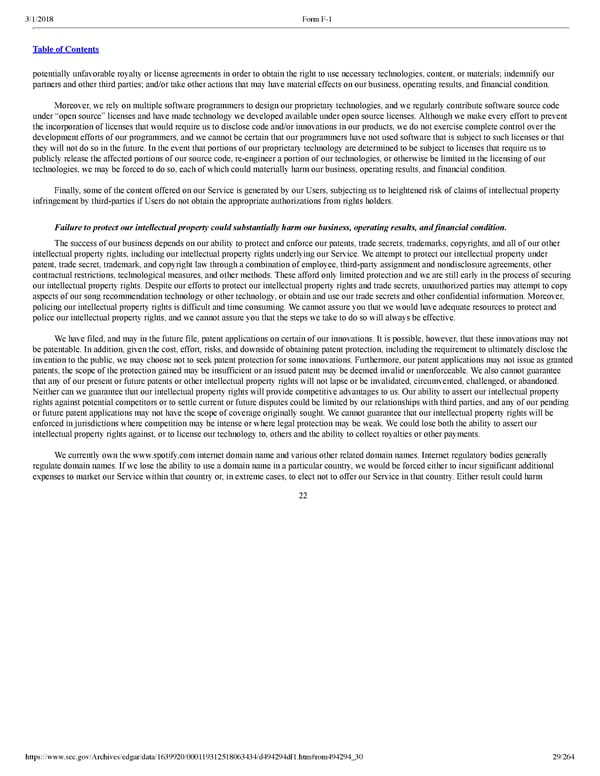29/264 potentially unfavorable royalty or license agreements in order to obtain the right to use necessary technologies, content, or materials; indemnify our partners and other third parties; and/or take other actions that may have material effects on our business, operating results, and financial condition. Moreover, we rely on multiple software programmers to design our proprietary technologies, and we regularly contribute software source code under “open source” licenses and have made technology we developed available under open source licenses. Although we make every effort to prevent the incorporation of licenses that would require us to disclose code and/or innovations in our products, we do not exercise complete control over the development efforts of our programmers, and we cannot be certain that our programmers have not used software that is subject to such licenses or that they will not do so in the future. In the event that portions of our proprietary technology are determined to be subject to licenses that require us to publicly release the affected portions of our source code, reengineer a portion of our technologies, or otherwise be limited in the licensing of our technologies, we may be forced to do so, each of which could materially harm our business, operating results, and financial condition. Finally, some of the content offered on our Service is generated by our Users, subjecting us to heightened risk of claims of intellectual property infringement by thirdparties if Users do not obtain the appropriate authorizations from rights holders. Failure to protect our intellectual property could substantially harm our business, operating results, and financial condition. The success of our business depends on our ability to protect and enforce our patents, trade secrets, trademarks, copyrights, and all of our other intellectual property rights, including our intellectual property rights underlying our Service. We attempt to protect our intellectual property under patent, trade secret, trademark, and copyright law through a combination of employee, thirdparty assignment and nondisclosure agreements, other contractual restrictions, technological measures, and other methods. These afford only limited protection and we are still early in the process of securing our intellectual property rights. Despite our efforts to protect our intellectual property rights and trade secrets, unauthorized parties may attempt to copy aspects of our song recommendation technology or other technology, or obtain and use our trade secrets and other confidential information. Moreover, policing our intellectual property rights is difficult and time consuming. We cannot assure you that we would have adequate resources to protect and police our intellectual property rights, and we cannot assure you that the steps we take to do so will always be effective. We have filed, and may in the future file, patent applications on certain of our innovations. It is possible, however, that these innovations may not be patentable. In addition, given the cost, effort, risks, and downside of obtaining patent protection, including the requirement to ultimately disclose the invention to the public, we may choose not to seek patent protection for some innovations. Furthermore, our patent applications may not issue as granted patents, the scope of the protection gained may be insufficient or an issued patent may be deemed invalid or unenforceable. We also cannot guarantee that any of our present or future patents or other intellectual property rights will not lapse or be invalidated, circumvented, challenged, or abandoned. Neither can we guarantee that our intellectual property rights will provide competitive advantages to us. Our ability to assert our intellectual property rights against potential competitors or to settle current or future disputes could be limited by our relationships with third parties, and any of our pending or future patent applications may not have the scope of coverage originally sought. We cannot guarantee that our intellectual property rights will be enforced in jurisdictions where competition may be intense or where legal protection may be weak. We could lose both the ability to assert our intellectual property rights against, or to license our technology to, others and the ability to collect royalties or other payments. We currently own the www.spotify.com internet domain name and various other related domain names. Internet regulatory bodies generally regulate domain names. If we lose the ability to use a domain name in a particular country, we would be forced either to incur significant additional expenses to market our Service within that country or, in extreme cases, to elect not to offer our Service in that country. Either result could harm 22
 Spotify F1 | Interactive Prospectus Page 28 Page 30
Spotify F1 | Interactive Prospectus Page 28 Page 30